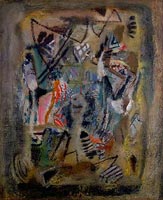| |
P R E S S > N E W Y
O R K C I T Y P R
E S S , 1 9 4 6 - 1 9 5 2
 |
Excerpts
From Paris Press, 1928-1933 |
| |
|
 |
The Paintings
of Ary Stillman- Chicago Tribune,
By B.J.Kospoth, December 1928 |
| |
|
 |
True art
Brings Original Touch in Our Lives, Asserts H.Ary Stillman
- The Sioux City Tribune, By H.Ary Stillman, October 26,
1929 |
| |
|
 |
Ary Stillman's
American Indians - Chicago Sunday
Tribune (Paris Edition), By B.J.Kospoth, Sunday, November
9, 1930 |
| |
|
 |
Excerpts
From New York City Press, 1934-1945 |
| |
|
 |
Excerpts
From New York City Press About Ary & Music, 1946-1952 |
| |
|
 |
A Rich Life
of Painting - Houston Chronicle, March
3, 1968 |
| |
|
 |
The
2 Realities of Ary Stillman -
Houston Post, By Eleanor Freed |
| |
|
 |
Stillman
Art Portrays 'Inner Reality' - San
Antonio Light, By Marcia Goren Weser, October 21, 1990 |
"These new compositions bear a direct relation
to music and might appropriately be called tone poems. A number
of them are on Indian themes, including the large Indian Legend,
with shimmering water suggested in the foreground, moving back
and around, but always within the picture frame."
The Art Digest
February 15, 1946
"... a style dominated by a new lyric use of color and aiming
at suggestion rather than representation. Paintings on Indian
themes remind one of music, as for example, Sibelius suggests
an old tribal war mood in 'Saga.'"
New York Times
February 24, 1946
"... I use colors like a Composer uses musical notes,' he
says, and although he has no actual system of color-and-sound
counterparts, as some extreme theorists have attempted, Stillman’s
paintings do remind one of the emotional overtones of certain
musical compositions."
Pictures on Exhibit
February 1949
 |
Jazz
1949
oil on canvas
Green Room
University of Houston,
Moores School of Music, TX |
"…Some titles, such as 'Jazz,' indicate
that certain ones have been inspired by hearing music…"
New York Times
January 29, 1950
"Ary Stillman's current
exhibition asserts again how well an abstract style can serve
lyrical statement and enrich the evocative image… Musical
themes inspire these paintings, and without descending to trite
analogies, they successfully translate the intangibles of one
art form into another. Overture, for example, captures the rising
sense of promising beginnings that such a musical composition
can offer…"
The Art Digest
February 1, 1950
"…Designed, for the most part, on musical themes (some
of his titles are "Obligato," "Overture,"
and "Jazz," the handsome new canvases are rhythmical
in pattern, so composed that the well-defined shapes hold together
in almost magnetic fashion."
New York Herald-Tribune
January 26, 1950
"... the rippling cadences with which he defines a mass of
form eliciting a sensation of movement…"
New York Herald-Tribune
January 21, 1951
"...Stillman's linear patterns always have been decidedly
musical. This year they are choppier than last, as if he had been
listening to Bartok instead of Debussy."
James Fitzimmons of Art Digest (now editor
of Art International)
January 15, 1952
"...On the other hand, Ary Stillman’s paintings at the
Bertha Schaefer
Gallery carry abstraction deep into its 'romantic' phase.
For him, plastic rhythms are a means of evoking poetic content.
Color, refulgent and suggestive, stirs the visual imagination
to respond to something beyond the world of pure shapes. Texture
and technique are also used to this end...."
New York Times
January 27, 1952
|
|

